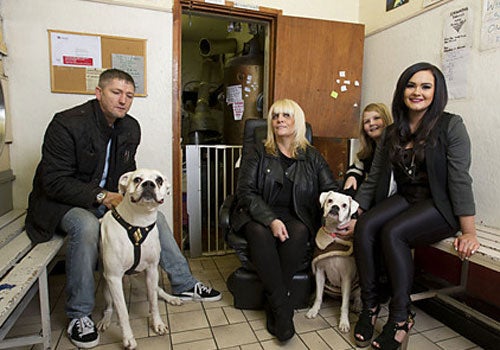'Harpurhey is not a hell hole': Manchester residents furious after BBC reality show's negative depiction of suburb

Your support helps us to tell the story
From reproductive rights to climate change to Big Tech, The Independent is on the ground when the story is developing. Whether it's investigating the financials of Elon Musk's pro-Trump PAC or producing our latest documentary, 'The A Word', which shines a light on the American women fighting for reproductive rights, we know how important it is to parse out the facts from the messaging.
At such a critical moment in US history, we need reporters on the ground. Your donation allows us to keep sending journalists to speak to both sides of the story.
The Independent is trusted by Americans across the entire political spectrum. And unlike many other quality news outlets, we choose not to lock Americans out of our reporting and analysis with paywalls. We believe quality journalism should be available to everyone, paid for by those who can afford it.
Your support makes all the difference.The makers of the BBC reality TV series People Like Us have been accused of bias and exploiting vulnerable locals by portraying a deprived Manchester suburb as a “hell hole”.
Residents in Harpurhey are demanding the series be cancelled and have called for an urgent meeting with the chairman of the corporation’s Trust, Chris Patten, over the use of licence payers money for what is claimed to be a “demolition job” on the area.
Locals are threatening to picket the BBC’s northern headquarters at MediaCity in Salford and claim that children from Harpurhey have been bullied at school, appointments at estate agents cancelled and young people turned down for jobs since the series began airing earlier this month.
Two hundred angry residents attended a public meeting this week to vent their frustration at the six-part BBC Three show, which is has attracts one million viewers and features binge drinking, anti-social behaviour and an alleged benefits culture.
Councillor Pat Karney said all the positive aspects of the community had been dropped by the filmmakers to make trash TV”
He said: “They have gone for extreme entertainment to chase ratings and are oblivious to the damage they are doing to the community. It makes Harpurhey, which is a normal working class area, to be a hell hole,” he said.
“Long gone are the days when a London production company could come up north and do a demolition job on us. They have never met people like us,” he said.
Harpurhey, which was the birthplace of author Anthony Burgess, was named the most deprived borough in England in 2007 by the Office of the Deputy Prime Minister.
Events in the documentary focus on the area around Moston Lane which was branded “booze alley” because of the 23 alcohol outlets along its 1.5 mile length. In one scene an elderly customer at a launderette is captured on CCTV using the rubbish bin as a toilet.

Watch Apple TV+ free for 7 days
New subscribers only. £8.99/mo. after free trial. Plan auto-renews until cancelled

Watch Apple TV+ free for 7 days
New subscribers only. £8.99/mo. after free trial. Plan auto-renews until cancelled
But locals say the area has improved in recent years with the building of an academy school, new youth and leisure centres and a library.
Local MP Graham Stringer said he would attend the meeting with Mr Patten. "I want to know how much … money this has cost, why a publicly-funded broadcast has gone to air with so little balance, and how that can be justified," he said.
Lisa Walker said her son Dale, 19, had been misrepresented as unemployed when he was doing a two-year apprenticeship and the final programme didn't mention his voluntary work.
"We weren't aware the show was going to come across like that and now we're really worried about what's going to be in future shows as it's not the show we were told it was going to be," she said.
People Like Us is made by Dragonfly Productions for the BBC. The company’s previous credits include One Born Every Minute and Battle of the Brides.
Series producer Simon Dickson said the series was for and about young people. “We wanted to make a programme that is about the human spirit,” he said. “I think it has been made exactly the way we set out to make it. We set out to show a range of characters experiencing the ups and downs of life,” he added.
A corporation spokeswoman defended the programme insisting it had been well received by those that took part.
“The series does not focus on negative stereotypes, indeed many of those featured are resilient, resourceful and ambitious young people with positive stories to tell – from running their own businesses to planning their future careers – and they do so with captivating wit and enthusiasm,” she said.
Join our commenting forum
Join thought-provoking conversations, follow other Independent readers and see their replies
Comments